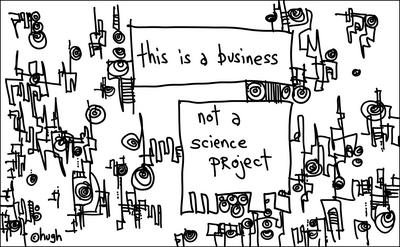
[“Science Project”: part of the Microsoft Blue Monster Series. Backstory from Steve and Kris etc.]
This cartoon was an attempt by me to sum up the answer to a very simple question: If Open Source software is free, then why bother spending money on Microsoft Partner stuff?
I already know what Microsoft’s detractors will say: “There’s no reason whatsoever. $40 billion per year is totally wasted.”
This, however is not a very satisfying answer, simply because it doesn’t quite ring true. Otherwise there’d be a lot more famous Open Source billionaires out there, being written up in Forbes Magazine or wherever. And Bill Gates would’ve been ousted years ago.
I know very little about software, so my hunch is that the reason Microsoft is able to make money, is simply that running a large business with 2000 people on the payroll requires very different ways of going about it, than just hacking together something in your garage. Open Source may be free [at least at first], but how well does it scale? How well does Open Source currently meet the needs of shareholders and CEOs?
You tell me. Anybody who has more insight than me [pro or anti Microsoft, I don’t care], please feel free to leave a comment, Thanks.
[Comment- Darcy Moen:]“Hugh, the question you need to answer is: Does software drive business development, or does need drive software development?”
Darcy, I think that is a question we all have yet to answer fully. I don’t think anybody has cracked it 100% yet.
The way you framed your comment [read it in its entirety below] implies that the gap that separates what you aspire to do, and what you are actually doing with software is minimal. Even knowing what little I know about how IT works in the REAL world, I am not entirely convinced.
The “Microsoft vs Open Source” question doesn’t interest me so much. The question, “What/How does Microsoft have to do/change if it wishes to survive the next thirty years” interests me greatly. And not just Microsoft, either…
[UPDATE:] “Why are the open source business people not ultra-rich yet?” Serious food for thought.
[UPDATED:] JP Rangaswami. “10 Reasons For Enterprise To Use Open Source.”
[UPDATE:] Seth Godin. “It’s not often that I disagree with Hugh, but this time, I do…”
[UPDATE:] Rick Segal. “Shareholders, CEOs, and (for the most part) Investors are generally clueless when it comes to the beginnings of your great idea. You take the tools (whatever they are), your vision, and your passion into the game. You create a solution and see if the dogs eat it. You don’t worry about pleasing anyone, just fix the problem. If it was worth fixing, if the product/service you offer has value/meaning to people, you are there. Your shareholders and your investors will be happy after your customers are.”
[Comment- James:] If Microsoft views me as a customer, then why do they go out of their way to get me the tools needed to drive sales on their behalf? Why am I always getting reminders about the free services they provide? I have yet to be approached by Microsoft to purchase software/products. Not once. Other companies flood me with product offerings that they want me to buy. Microsoft doesn’t. They give me what I need to drive sales, which ultimately some ends in MS’s coffers, but also puts some in mine as well. I’ve come out ahead in my Partnership with Microsoft to this point, I wouldn’t say I’m a customer based on that. Customers end up on the negative side of the money equation, not ahead.
[AFTERTHOUGHT:] I am sad to report that Microsoft’s Steve Clayton has gone on vacation this week, so we won’t be having his wonderful contributions in the comments section for a while. But I’m hoping other MS folk and Partners will join in the discussion in his absence etc.]
[Bonus Link:] “10 things they didn’t tell you about blogging.” Fabulous.
 The Gapingvoid Email - free insights & inspiration three times a week!
The Gapingvoid Email - free insights & inspiration three times a week!
wpDiscuz


